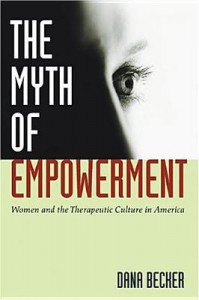Myth of Empowerment: Women and the Therapeutic Culture in America
 To begin with, I was expecting a completely different book. I thought I was reading something that would dismantle the world of self-help books and self-esteem, but that's not what she focuses on. Her focus is on the history of women being told they're crazy, but it's really society that's holding the back.
To begin with, I was expecting a completely different book. I thought I was reading something that would dismantle the world of self-help books and self-esteem, but that's not what she focuses on. Her focus is on the history of women being told they're crazy, but it's really society that's holding the back.It took me a while to get through this book, and I had to reread multiple passages before I finally figured out what she was trying to say. It's much more than just academic style that's the problem. It's her writing style that's confusing. At times, the author can be condescending, especially towards the end of the book, and she only looks at a few sides of the argument.
Most of her argument seems to be based on the philosophical side of psychology and not the medical side. In the nineteenth-century, I wouldn't doubt it if they tried to argue that the philosophical side of human nature was the medical side, but now we know that's not the truth. A good bit of her material is actually from the 1980s, especially the book Habits of the Heart by Bellah. I read that book, and I personally disagree with her interpretations of it, but I suppose to each their own. To me, the people's values reflected the events of their culture, such as the Vietnam War and Korean War, and not necessarily a focus on the individual. I suppose it's actually a mix of multiples things and not just one cause or another.
Becker's focus tends to be on middle class women who are mentally healthy and don't necessarily have mental illnesses. This is not a book discussing mental illnesses, such as schizophrenia or compulsive-obsessive disorder. She does touch on depression once or twice, and even mentions PTSD, but only in passing. And I think that's a very important distinction that she doesn't make in her book. This book is about healthy women who society may view as "sick" because they aren't following the stereotype of the healthy woman or at least the "super" woman.
The first part of the book sets up her argument, focusing on the historical view of women in American society, and then the last section, especially the last chapter, finally gets to the meaty part of her argument about therapy essentially telling women that their problems are their fault. She does critique individualism, and America's societal belief that you can be anything that you set your mind to. I agree with her, individualism is overrated and we're not as individualistic as we think we are. As much as we try to become what we want, there are still barriers in our way, especially if we are poor, not the right gender, race, or LGBT.
I don't think she does a good job discussing depression in women. She cherry-picked an article on depression and marriage, which was published in 1998. It's disturbing to me that she only used one scientific article on depression, especially one that was cherry-picked based on something that clearly has female-male gender roles, and worst of all it's from 1998. This book was published in 2005, she could have at least found something from 2000 or 2002. Two-four years can make a big difference in the research world.
I wish she would've found a longitudinal article that looked at rates of depression in women in poverty, and that looked at those same women after they received welfare assistance or escaped poverty. I think the difference between those numbers could show that depression may not have to be located within the individual's psyche, but instead in their individual's circumstances.
I'm not completely convinced that therapy is a political statement, or at least a political act. If it was, it would make more sense to have group therapy and encourage political action. I never went to therapy for political action or to change society, I went so I would be able to function like a normal human being. Of the three counselors that I've seen, none of them have suggested things like, "Maybe you should have less stress" instead they pointed out problems that I could fix or work on. Not all of it was individual. Some of it involved friends or other people. In my opinion, therapists are aware that a human is an individual and also the sum of his or her environments.
Becker didn't touch the idea of an internal locus and external locus. People who have internal loci are more likely to be resilient and face fewer health issues. People who have an external loci tend to develop learned helplessness and sort of sabotage themselves, not on purpose but because they don't believe they have any control over what happens to them. Discussing these loci could possibly have strengthened her argument on empowerment. We know from research that when people believe they have control over their lives, they're usually better off. Perhaps the therapists empower people by making them believe in themselves. This runs into a problem with empowering the individual, but power is dependent on a social context problem. Perhaps people have relationships with themselves and can empower their present selves in regards to their past selves. It's just an idea, but perhaps it relies too much on the individualistic notion again that runs people into problems. We don't exist in social vacuums, and power struggles between people are real things. Furthermore, some therapists act as a social model, so if a person learns how to negotiate power with a therapist, perhaps they can develop skills to negotiate power with other people.
Finally, I have a hunch that therapists focus more on the individual because you can't change the world by yourself. It's a romantic notion that the power of one is all it takes to change the world, but that's a lie. It's take collective action to leave a mark in history. One person influences another until you've gotten enough people influenced to take a stand against the status quo. So once again, why should a therapist focus on collective action with a person when all the therapist can influence is the individual patient in his or her office? You can't change someone else, you can only change yourself. Honestly, it may not be the place of a psychologist or psychiatrist to get someone out of poverty or out of inequality situations. That's the role of the government and social organizations in the community. A therapist should be able to help someone get involved in their community, but I don't believe they can actually encourage someone to change the political system or even stereotypes.
I think Becker has a good point, that sometimes it's literally not us and it's the system. However, I don't think she used enough evidence to back up her ideas. It's true we should distinguish the difference between health issues caused by someone's circumstances and health issues caused by someone's biology. Sometimes they may overlap since genes and environments affect each other, but sometimes it really is someone's circumstances, such as stereotypes, holding them back. This is a complex and complicated issue that needs to be explored more.




